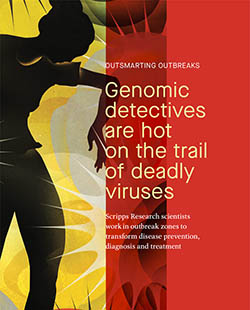Early detection is critical to preventing large-scale disease outbreaks
Infectious diseases represent a significant public health burden, especially in low and middle-income countries. HIV/AIDS and malaria, as well as many neglected tropical diseases, take an enormous toll on countries in Sub-Saharan Africa, Asia and Latin America.
Over recent years, new and emerging diseases such as COVID-19, SARS, MERS, H1N1/A, Ebola and Zika have caught local, national and international responders off guard. In an increasingly interconnected world, improving disease detection, surveillance and diagnostic tools and resources is critical to addressing the challenges infectious diseases present.
Scientists at Scripps Research are developing tools to quickly and effectively detect disease outbreaks as they emerge.
Genomic Detectives
Scientists at Scripps Research are using genomic epidemiology to detect and track deadly viral outbreaks. Read article in Scripps Research Magazine.
Meet Karthik
Understanding how and why viruses spread is critical to our ability to respond to disease outbreaks.
Karthik Gangavarapu is a doctoral student and computational scientist in the laboratory of Kristian Andersen at Scripps Research. With expertise in virus genetics and computer programming, Karthik is developing software that helps scientists analyze large amounts of genetic data to detect viruses and understand how they spread.
With collaborators across the globe, Karthik and his colleagues aim to transform the way local, national and international officials and healthcare providers are able to respond to disease outbreaks.


